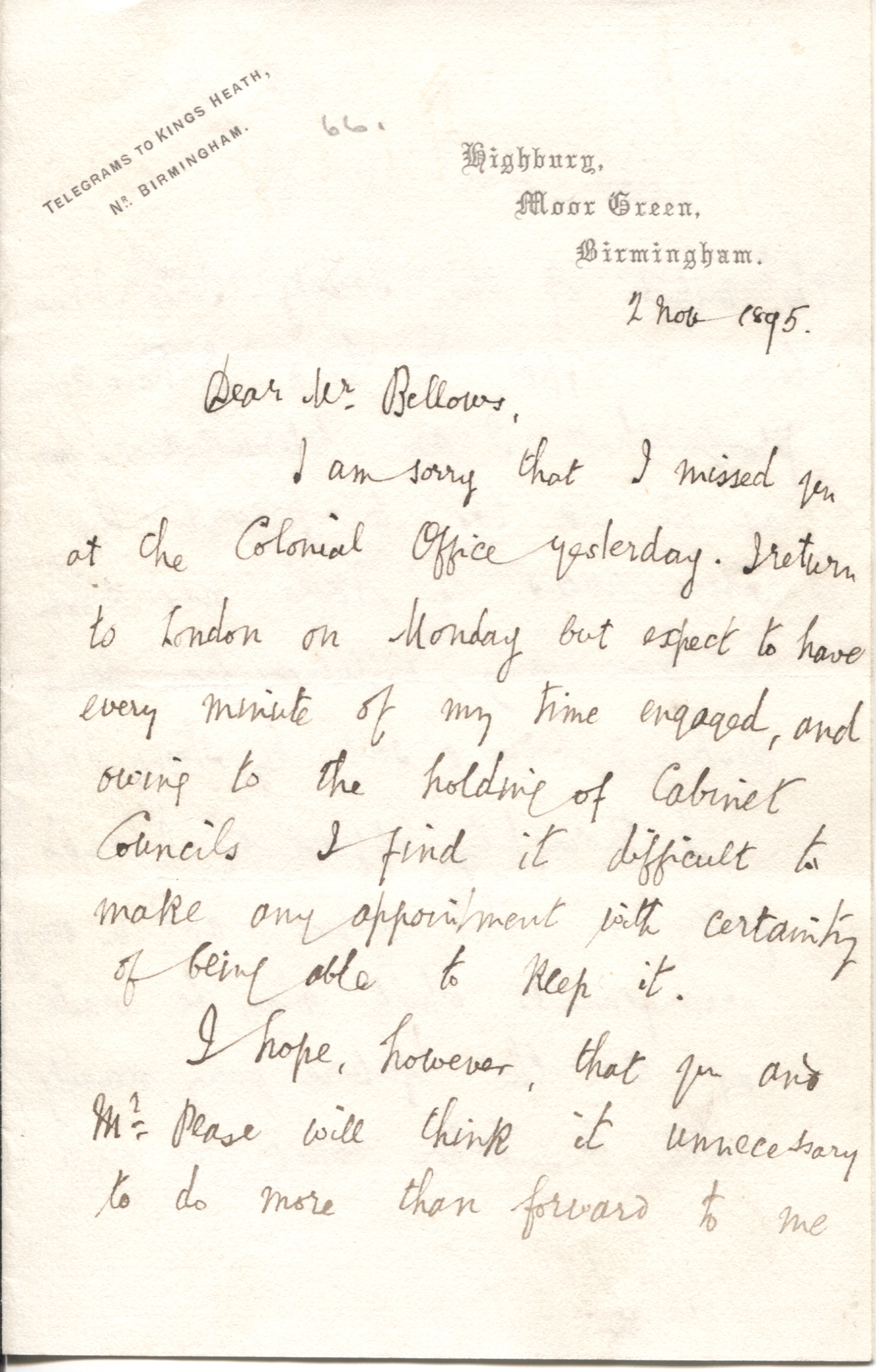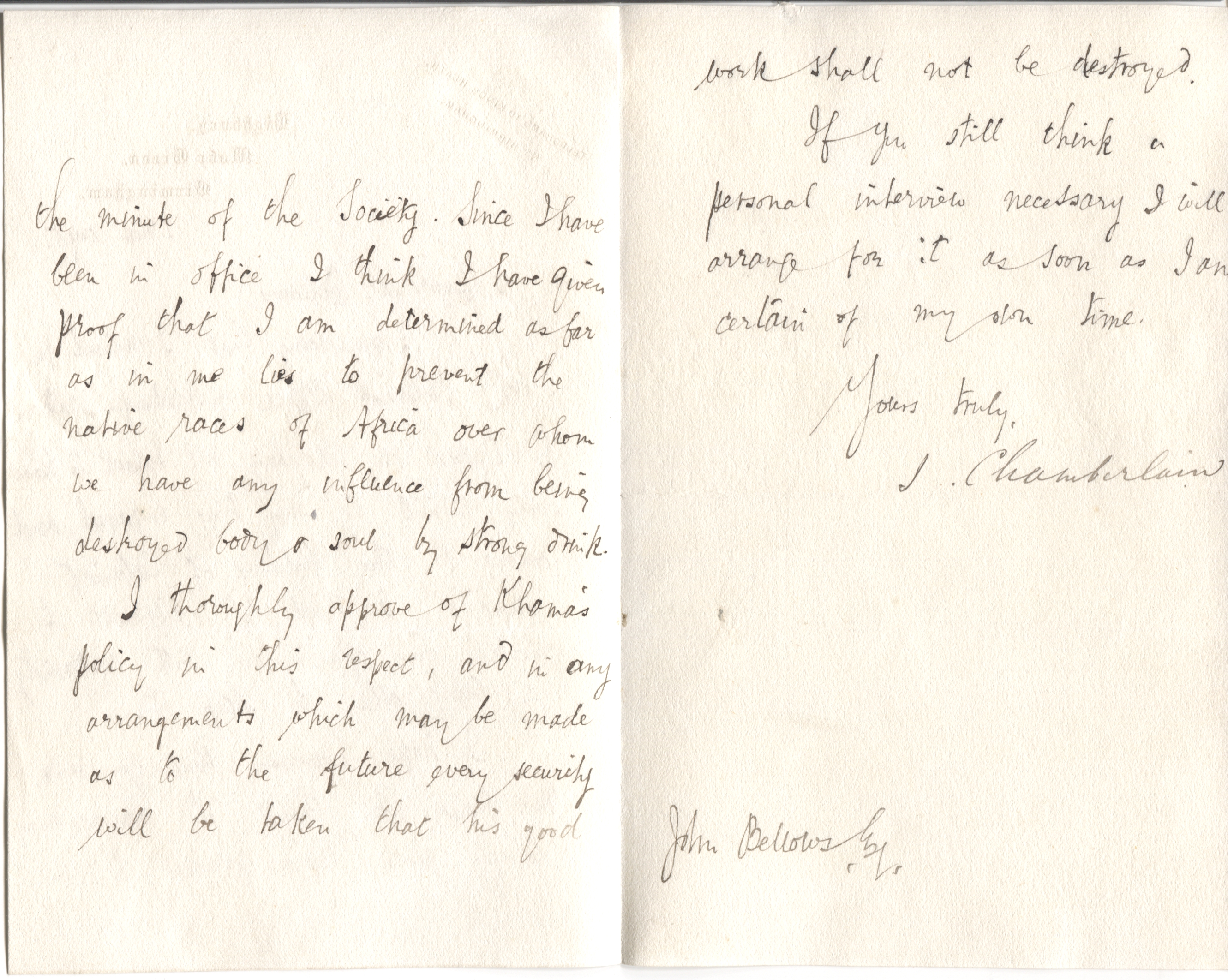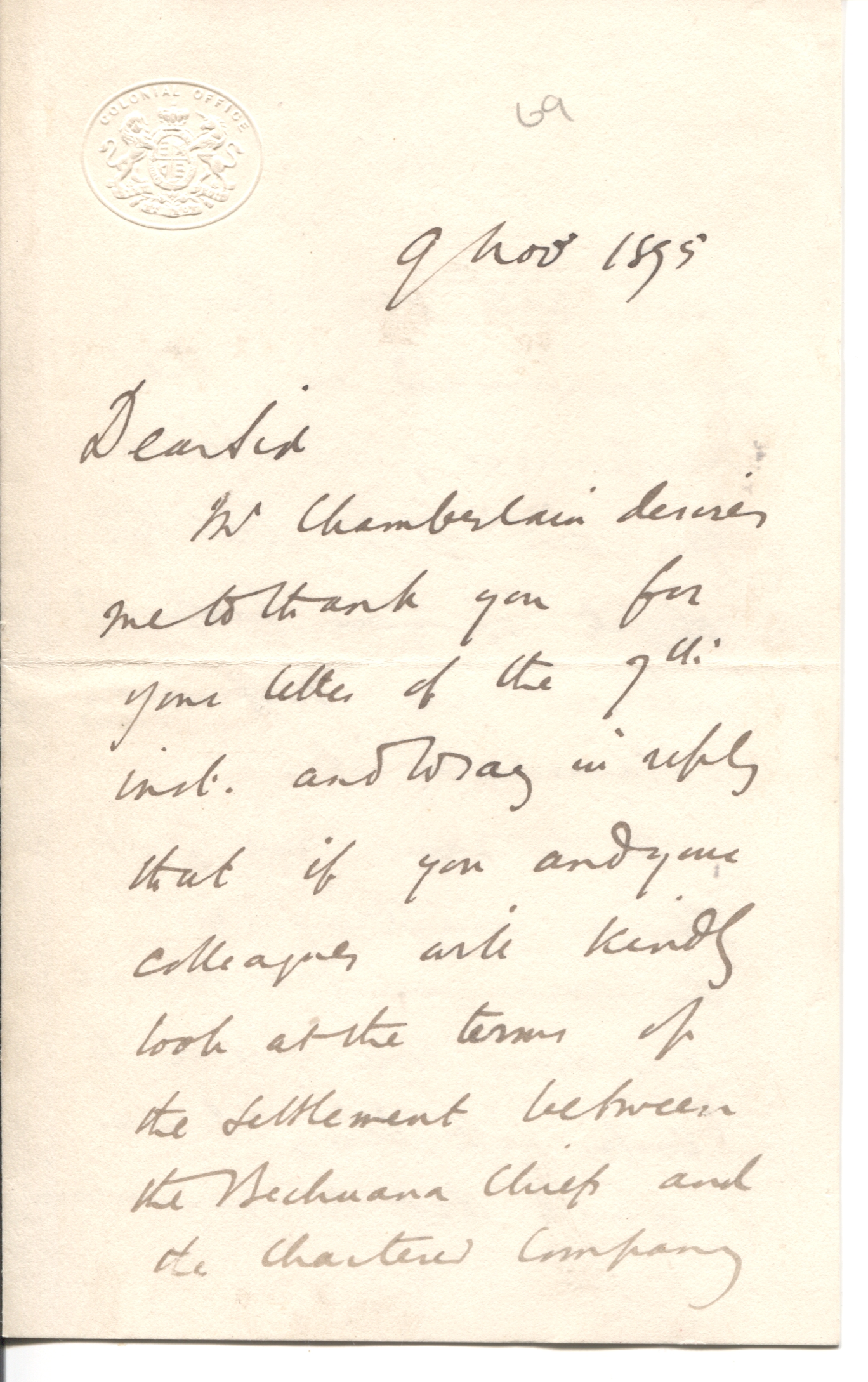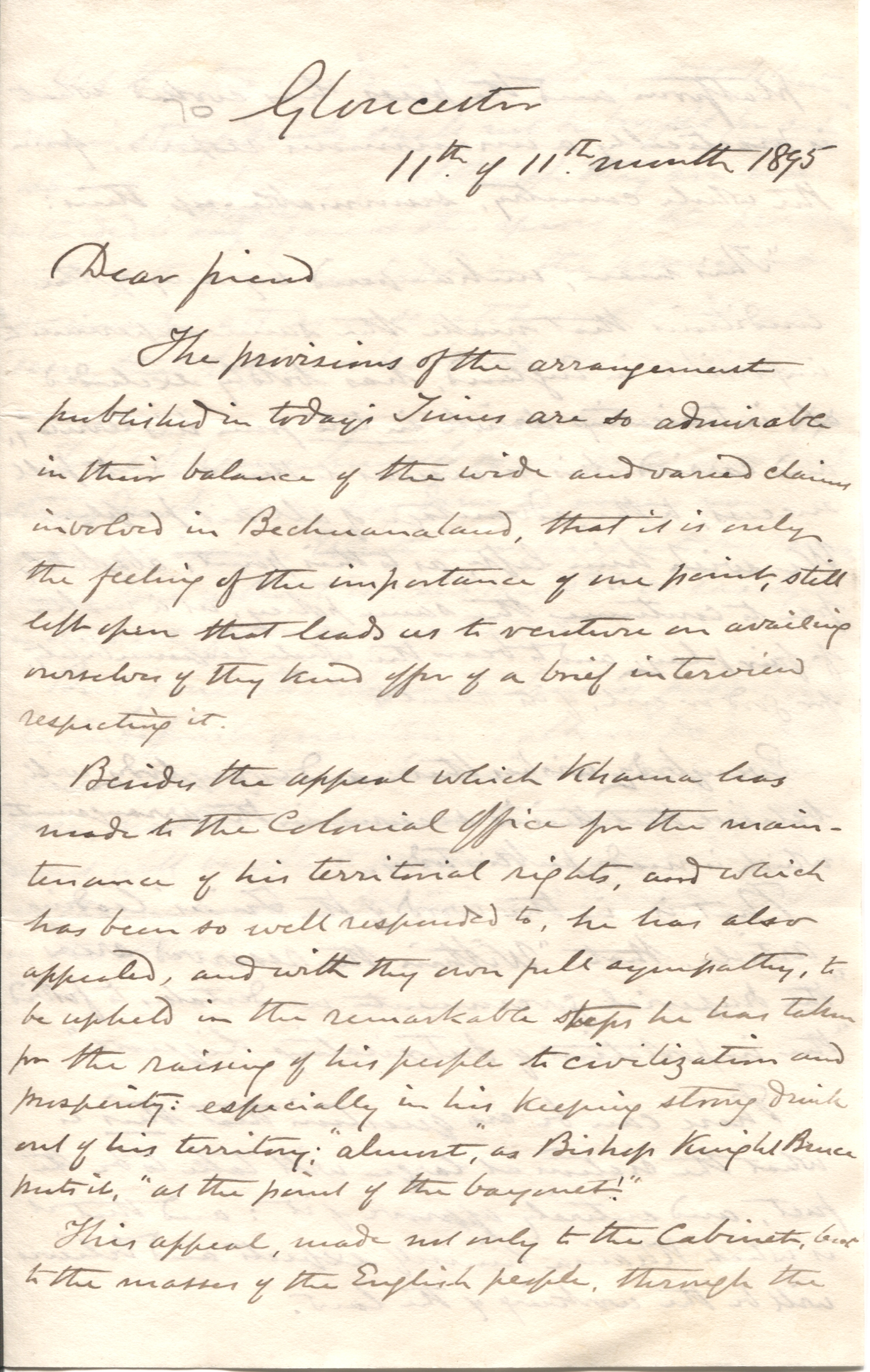
CHAMBERLAIN IS “DETERMINED... TO PREVENT THE NATIVE RACES OF AFRICA OVER WHOM WE HAVE ANY INFLUENCE FROM BEING DESTROYED BODY AND SOUL BY STRONG DRINK”
CHAMBERLAIN
(Joseph, 1836-1914, M.P. for Birmingham, from 1891 Leader of the Liberal Unionists, Secretary for the Colonies 1895-1903)
Fine Letter Signed to Mr BELLOWS
(John Thomas, 1831-1902, Polymath, Printer and Lexicographer) regretting that he missed him “at the Colonial Office yesterday. I return to London on Monday but expect to have every minute of my time engaged, and owing to the holding of Cabinet Councils I find it difficult to make any appointment with certainty of being able to keep it. I hope, however, that you and Mr Pease will think it unnecessary to do more than forward to me the minute of the Society. Since I have been in office I think I have given proof that I am determined as far as in me lies to prevent the native races of Africa over whom we have any influence from being destroyed body & soul by strong drink. I thoroughly approve of Khama’s policy in this respect, and in any arrangement to which may be made as to the future every security will be taken that this good work shall not be destroyed...”, 3 sides 8vo., Highbury Moor Green, Birmingham headed paper, 2nd November 1895 together with a small quantity of letters to and from Bellows on the subject, the first from H. T. Wilson saying that “Mr Chamberlain desires me to thank you... and to say... that if you and your colleagues will kindly look at the terms of the settlement between the Bechuana Chief and the Chartered Company which will very shortly be announced in the newspapers, he thinks you will find that the object of your proposed interests are sufficiently obtained...”, 3 sides 8vo., Colonial Office headed paper, 9th November, the next two from Bellows to Chamberlain, one signed, the other a copy, concerning this “arrangement with the Bechuana Chiefs published in today’s Times, is so admirable in its balance of the wide and varied claims that are involved in it, that it is only the feeling of the importance of one peril still left open, which has led us to ask for the interview that was kindly offered to accord to the delegates of the Society of Friends. Khama’s appeal to the Colonial Office for the maintenance of his territorial rights, has met with full and just recognition and he has also appealed, with thy own full sympathy, to be upheld in the remarkable steps he has taken for the raising of his people to civilization and prosperity, especially as regards his keeping strong drink out of his territory; as Bishop Knight Bruce has put it ‘almost at the point of the bayonet’. This appeal made, not only to the Cabinet, but to the masses of the English people, through the platform and the press has evoked what is practically a unanimous response from the whole country...” continuing at length about Khama’s government of his people and then saying that “There are however two words in the letter which, while not intended to operate against the spirit of the provision, will certainly do so. ie that White man’s strong drink shall not be brought ‘for sale’ into the territory. If these words are embodied in the permanent document they cannot fail to act like a scratch across the tip of a dam, which begins a self-increasing leak...”, each 3 sides 8vo., Gloucester, 11th of November, the next from Wilson again arranging for the requested meeting, 2 sides 8vo., Colonial Office headed paper, 13th November, the next is a long Typed Letter Signed from Rev Ralph Wardlaw THOMPSON (1842-1916, Foreight Secretary of the London Missionary Society) to Bellows, thanking him for the interest the Society of Friends has taken in the matter and saying that “there can be no doubt that in some parts of South Africa where the prohibitive law with reference to the sale of intoxicating liquors for natives is enforced, a good deal of mischief is done by licences to sell drink the the white men... In the territory of the three Chiefs the evil has been known only in a very modified degree. Bathoen has complained of a licence given to a store keeper at Kanye. Sebele and many of his tribesmen have I fear yielded to temptation... In Khama’s country no licences of any kind have been issued... Mr Chamberlain in the settlement made with the Chiefs last week has gone much further in the direction of restriction that has been attempted by his predecessors... the Government can scarcely go furher than this in the direction of prohibition...” and suggesting that there isn’t a lot of point in them meeting with the Colonial Secretary, 2 sides A4, London Missionary Society headed paper, 13th November, the final two are from Bellows, saying that “the Chiefs might like to have a copy of the minute which the Society of Friends presented to the Secretary for the Colonies... it will at least assure them that they have the sympathy of many in England... A firm Imperial Government and a Queen whom we love, are blessings from heaven, yet they cannot guard against any contingency, or stave off some of the harm that comes along with the good in such changes as the opening up of African lands to our countrymen...”, 3 sides 8vo., Upton Knoll, Gloucester, 22nd November and finally he thanks Chamberlain for his letter as will “everyone who has felt an interest in the Bechuana Chiefs, for the care and judgement with which thou has brought their matter to a settlement...”, 1 side 8vo., no place, 25th November all
Khama’s Country was in Botswana. San (Bushmen) were the aboriginal inhabitants but they constitute only a small portion of the population today. The Tswana supplanted the San, who remained as subjects. Beginning in the 1820s, the region was disrupted by the expansion of the Zulu and their offshoot, the Ndebele. However, Khama II, chief of the Ngwato (the largest Tswana nation), curbed the depredations of the Ndebele and established a fairly unified state. A new threat arose in the late 19th cent. with the incursion of Boers (Afrikaners) from neighboring Transvaal. After gold was discovered in the region in 1867, the Transvaal government sought to annex parts of Botswana. Although the British forbade annexation, the Boers continued to encroach on native lands during the 1870s and 80s. German colonial expansion in South West Africa (Namibia) caused the British to reexamine their policies, and, urged on by Khama III, they established (1884–85) a protectorate called Bechuanaland. Britain provided for the eventual transfer of Bechuanaland to the Union of South Africa.
From the 1895 general election the Liberal Unionists were in coalition with the Conservative Party, under Chamberlain's former opponent Lord Salisbury. In that government Chamberlain served as Secretary of State for the Colonies, promoting a variety of schemes to build up the Empire in Asia, Africa, and the West Indies. He had major responsibility for causing the Second Boer War (1899–1902) in South Africa and was the government minister most responsible for the war effort.
Item Date:
1895
Stock No:
41866




<< Back